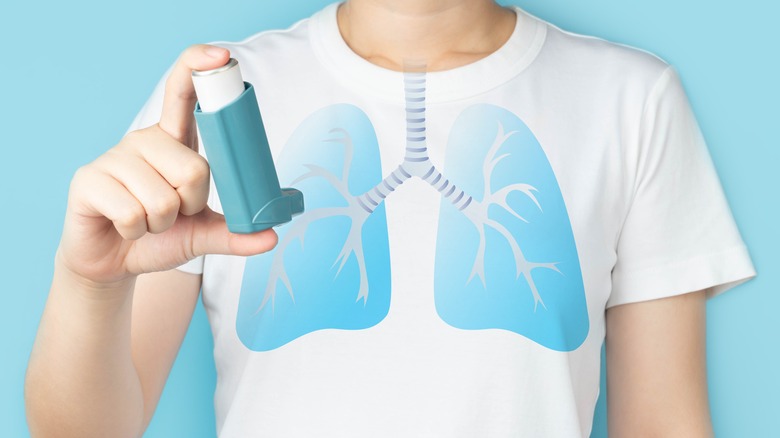What To Expect When You Go To The Hospital For A Severe Asthma Attack
If you have asthma or know someone who does, you understand how frightening it can be to experience an asthma attack.The Asthma and Allergy Foundation of America reports that asthma is one of the most common diseases in the United States, affecting approximately 25 million Americans — which equates to about one in 13 people. Often beginning in childhood, asthma can persist throughout adulthood, and the National Heart, Lung, and Blood Institute (NIH) explains that there is no known cure for the condition. Developing a treatment plan with a doctor can help someone cope with their symptoms and identify any triggers that could be making your asthma worse, like pollen, cold air, or exercise, so that they can potentially be avoided in the future.
During an asthma attack, the muscles surrounding the airways of the lungs are tightened, making it more difficult to breathe (per WebMD). The lining of these airways also becomes inflamed with mucus that is thicker than normal. As a result, someone with asthma may experience symptoms of an asthma attack. These may include wheezing, uncontrollable coughing, chest tightness, or a pale face and blue lips. If you have any of the symptoms of a severe asthma attack or notice them in someone else, it's important to call 911 right away and seek out immediate medical attention. If you're admitted to the hospital for asthma treatment, here's what happens and how you will be treated by medical professionals.
Treatment for asthma attacks
Having to go to the hospital for any reason is intimidating enough, and it may help to know what you might expect when being treated for an asthma attack. If you're having a severe asthma attack, you will need immediate care once arriving at the emergency room, reports Healthline. While there, you may be given short-acting beta-antagonists such as albuterol, which are similar medications to your typical asthma rescue inhaler but can be taken with a nebulizer. Compared to an inhaler, a nebulizer distributes medication into the lungs more easily (via Medline Plus). If albuterol doesn't relieve the attack, a medication called ipratropium may be administered to open your airways. You may also be given corticosteroids in tablet form or through an intravenous line (IV), which will work to reduce inflammation in the lungs.
How long someone might stay in the hospital depends on the severity of their attack and how well their bodies respond to treatment. If a patient's life is at risk, they may be required to stay in an intensive care unit (ICU) of the hospital, where they will be constantly monitored by doctors (per Healthline). When returning home after a hospital stay for a severe asthma attack, you may feel mentally and physically exhausted. It's important to be patient with yourself and your body while adjusting back to your normal routine.


